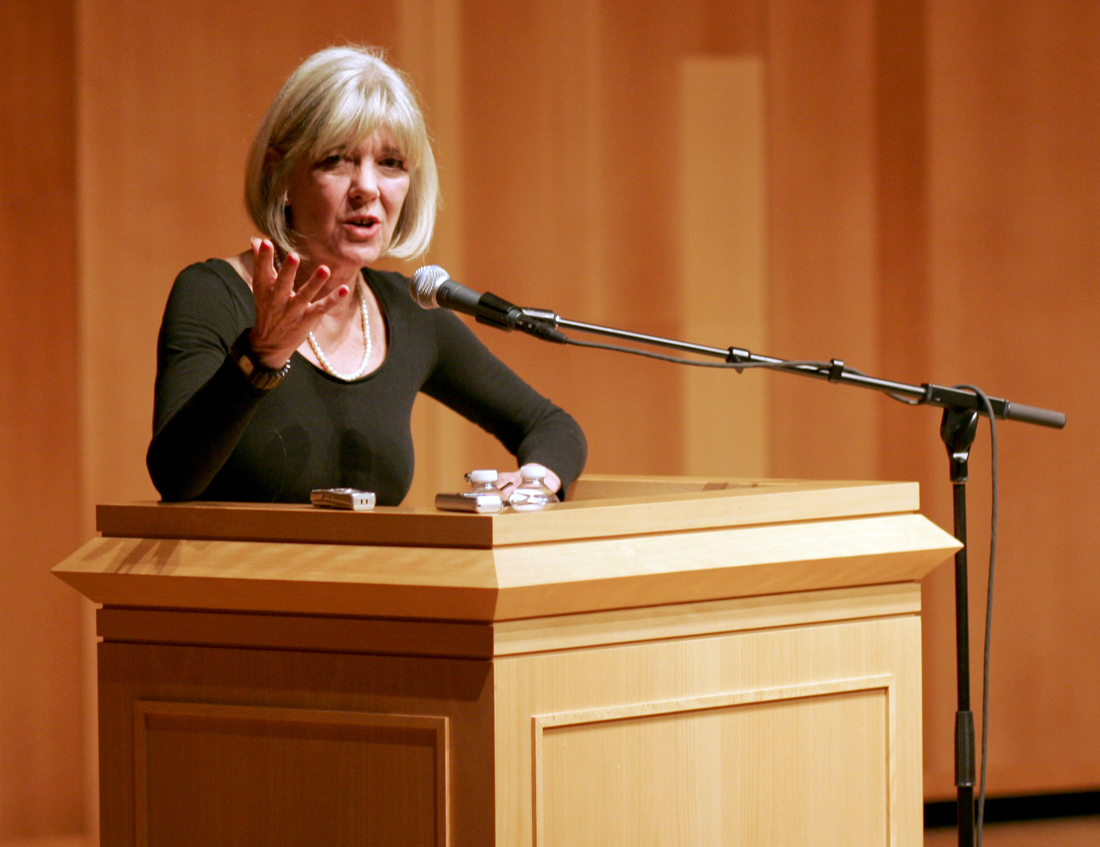Garrels: International correspondents a dying breed
Senior Foreign Correspondent for National Public Radio (NPR) Anne Garrels visited Utah State this week to speak about her experiences in covering war as a journalist and share some poignant memories.
Thursday, Garrels spoke at the Performance Hall in the fourth installment of the university’s Morris Media and Society Lecture Series, sponsored by the journalism department.
Garrels has received many awards and high honors for her news coverage of both wars in Iraq, the war in Afghanistan and several other places such as Kosovo and Bosnia, said Utah Public Radio interim director Nora Zambrino, who introduced Garrels.
“Garrels has put a human face on conflict, combining experience in the field with a sharp understanding of the policy debates in Washington,” Zambrino said.
Taking the stage, Garrels said she was part of a dying breed of journalists, comparing herself to a Neanderthal. Her lament was in reference to the “uncertain future” of journalism, specifically the work of foreign correspondents.
“I merely report about the life and death of Americans, I write about the uncertain fate of billions of dollars of your tax money, I report about the world beyond our borders,” Garrels said.
New technology and its influence on the evolution of mass media, has good and bad sides to it, she said. It was a lot easier for police states to control or censor journalists before cellphones and iPods.
Now, foreign correspondents are more capable of getting information to the public. She said learning new technology is important for aspiring journalists but it is not everything.
“What doesn’t change is the imperative that you ask good questions, that you have something to say and you say it well,” Garrels said.
“We do have standards, clear standards, which we try to uphold,” she said. “I fear that the revolt against the media is that many in America, now, don’t like questions and information that make them uncomfortable,”
There is a current trend in the media, she said, of information being repeated and used by several people for their own purposes. To uphold journalistic integrity, information found on the Internet must be checked.
“Americans are, more and more, seeking outlets that are opinion masquerading as facts,” she said, “outlets that confirm already held biases and beliefs.”
Cutbacks in foreign reporting result from a lack of funding for Internet media sites and the decline of the mainstream media. Garrels said she was lucky to be with NPR for the past 25 years, where there are adequate tools to do her job.
Embedding, or “hanging out” with the military in places like Baghdad during wartime, is how foreign correspondents gather information. Garrels said she was able to get information to Americans that the military would have otherwise withheld if she would not have been there.
“We need as many experienced witnesses around the globe as possible, and I use the word experience advisedly,” she said. “I know I’m a much better reporter than when I started … only by being on the ground, can you truly report on events.”
Garrels said she stayed in Iraq for six years because simply making phone calls could not have substituted for actually being on the ground, reporting.
She said some of her best stories came from talking to people and not knowing where the conversations would end up.
One night, she said, she was embedded with some soldiers and had the opportunity to record them talking about their lives, where they were from and what they were afraid of. The next day, two of the soldiers were killed.
I had all of this tape and I was in communication with the families,” Garrels said. “I sent them all this tape of the last night with their sons … I couldn’t possibly give them back their sons, but I gave them their last moments.”
After Garrels gave her lecture, the audience was invited to ask questions. One audience member asked if any of her reporting was edited or censored. She said there were certain things she was forbidden from doing, but no information was held back.
Another audience member said Garrels would make a great commentator and asked what subject she would address if she was.
She said, “Well, I’m not a commentator, I’m not a witty, snappy shouter, I would never make it on Fox News.” Garrel’s response was met with laughter and applause from the audience.
Thank you for your interest. I intend to come back and haunt you somehow,” Garrels said. “This is a very, very special place and I really mean it.”
– dan.whitney.smith@aggiemail.usu.edu

